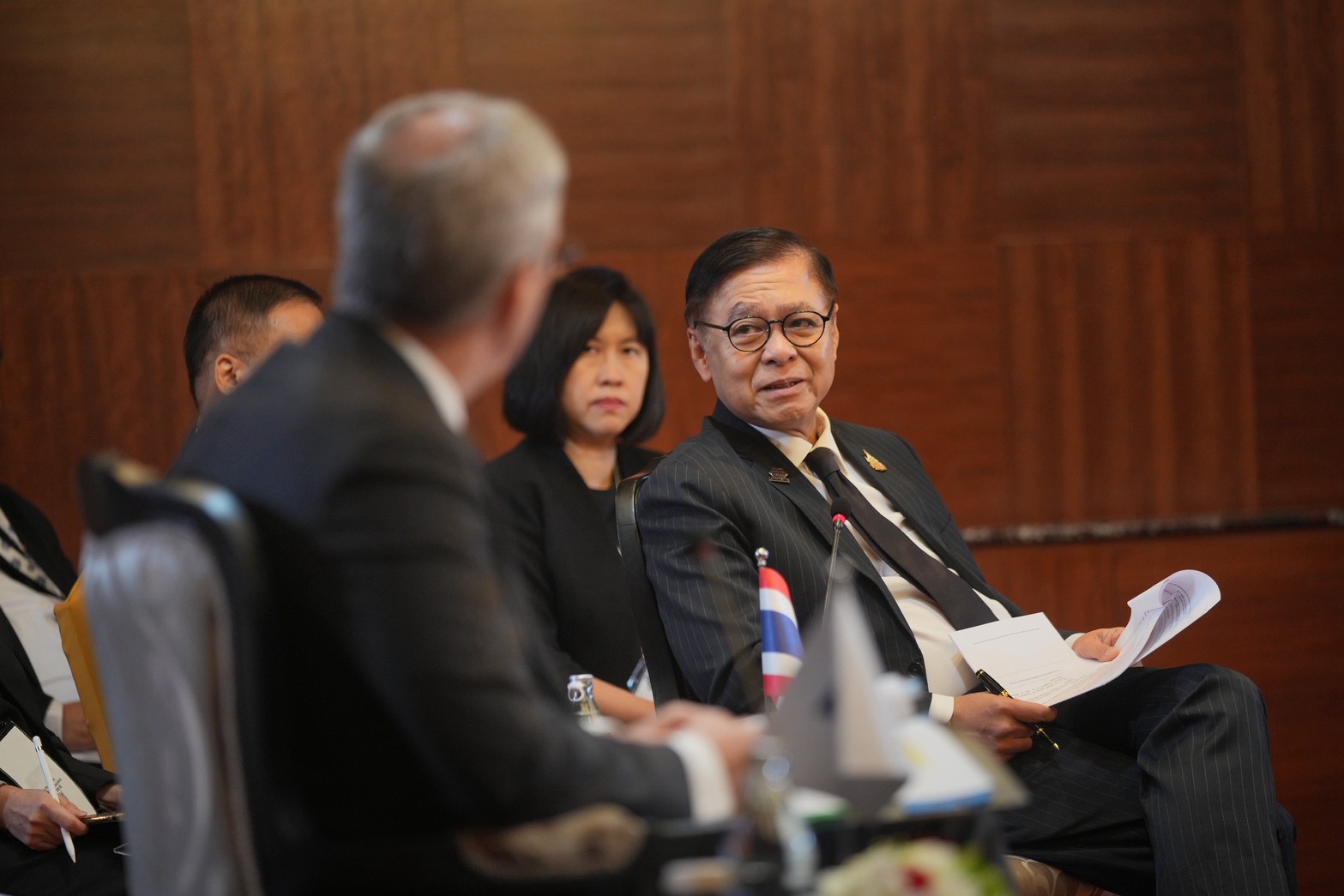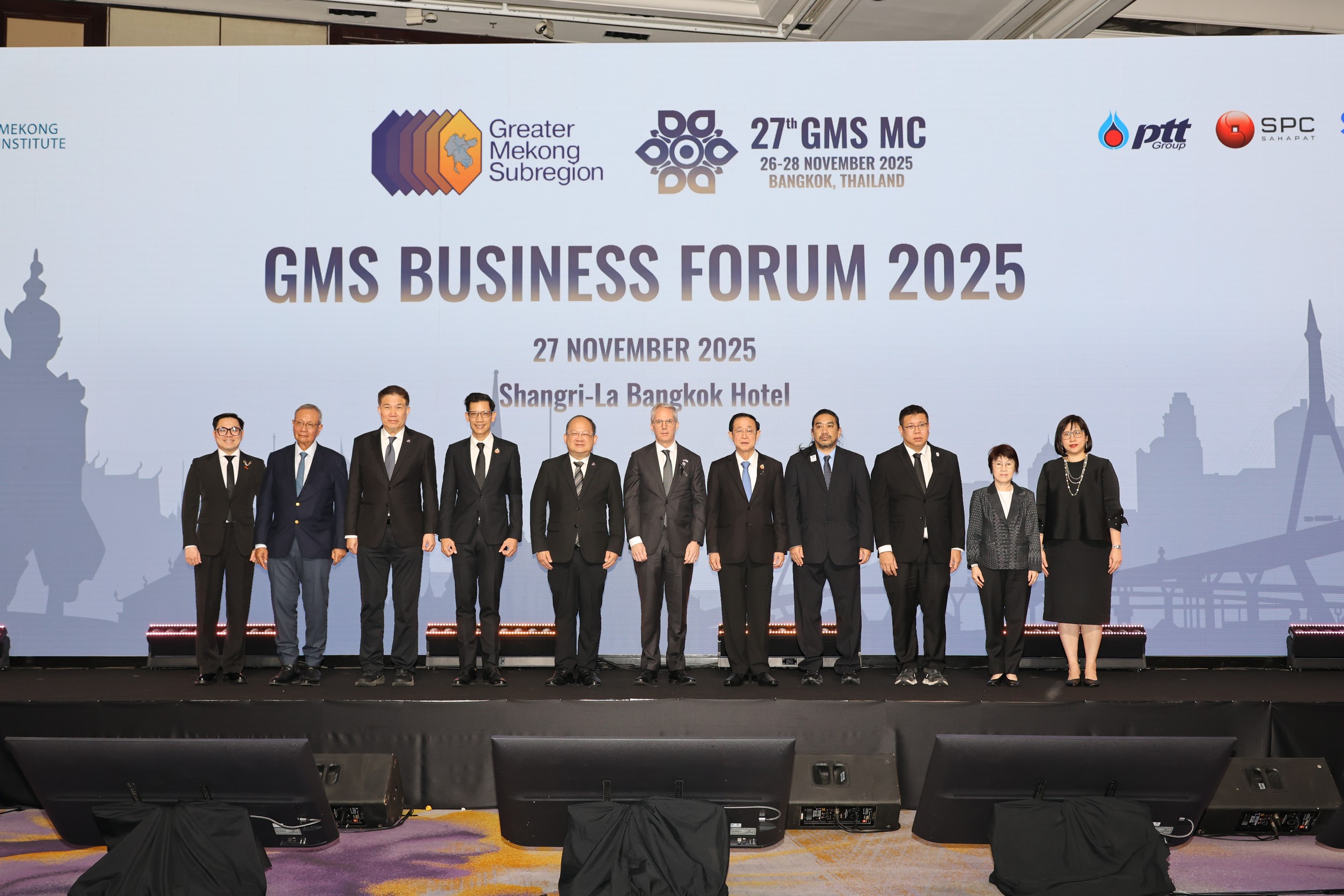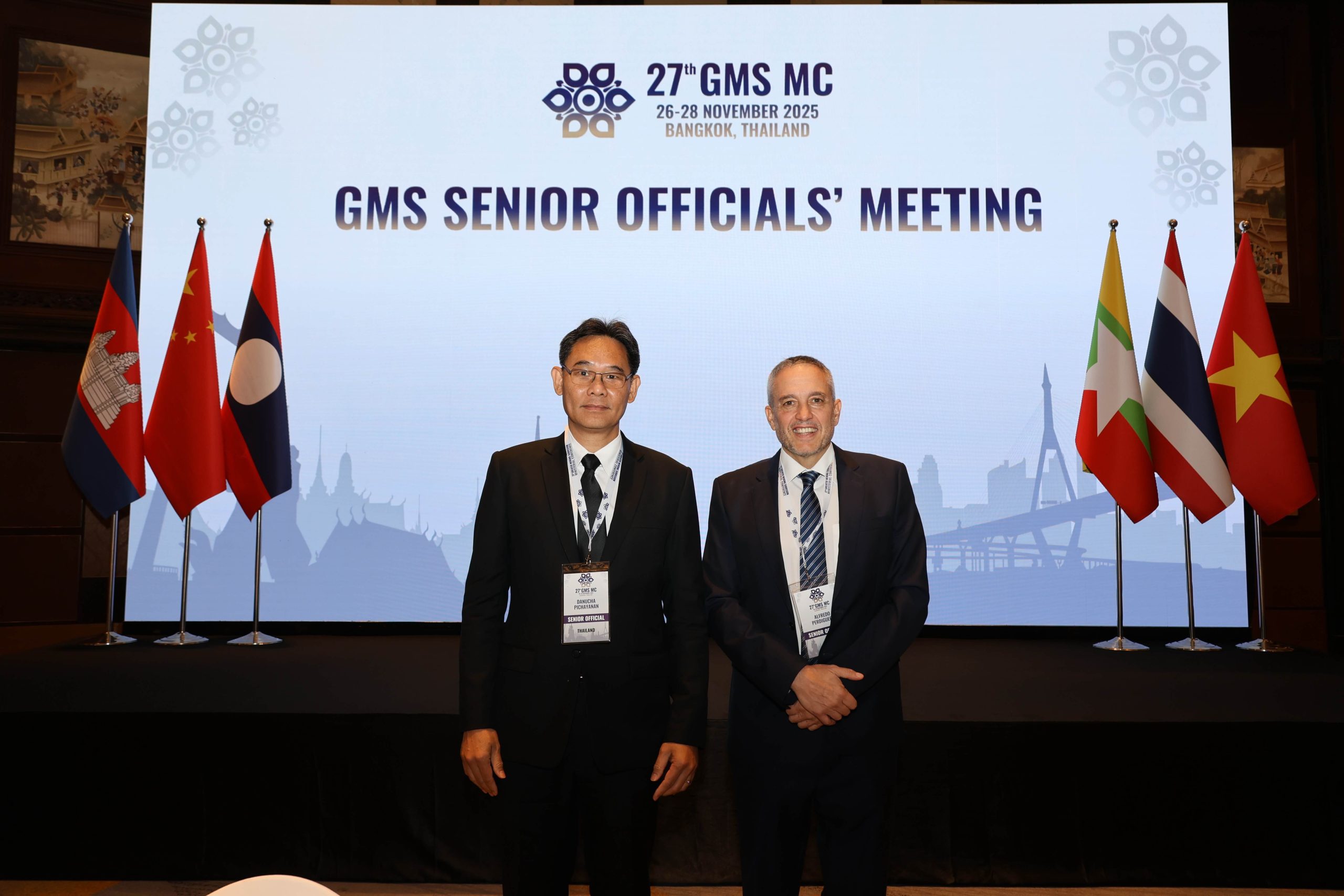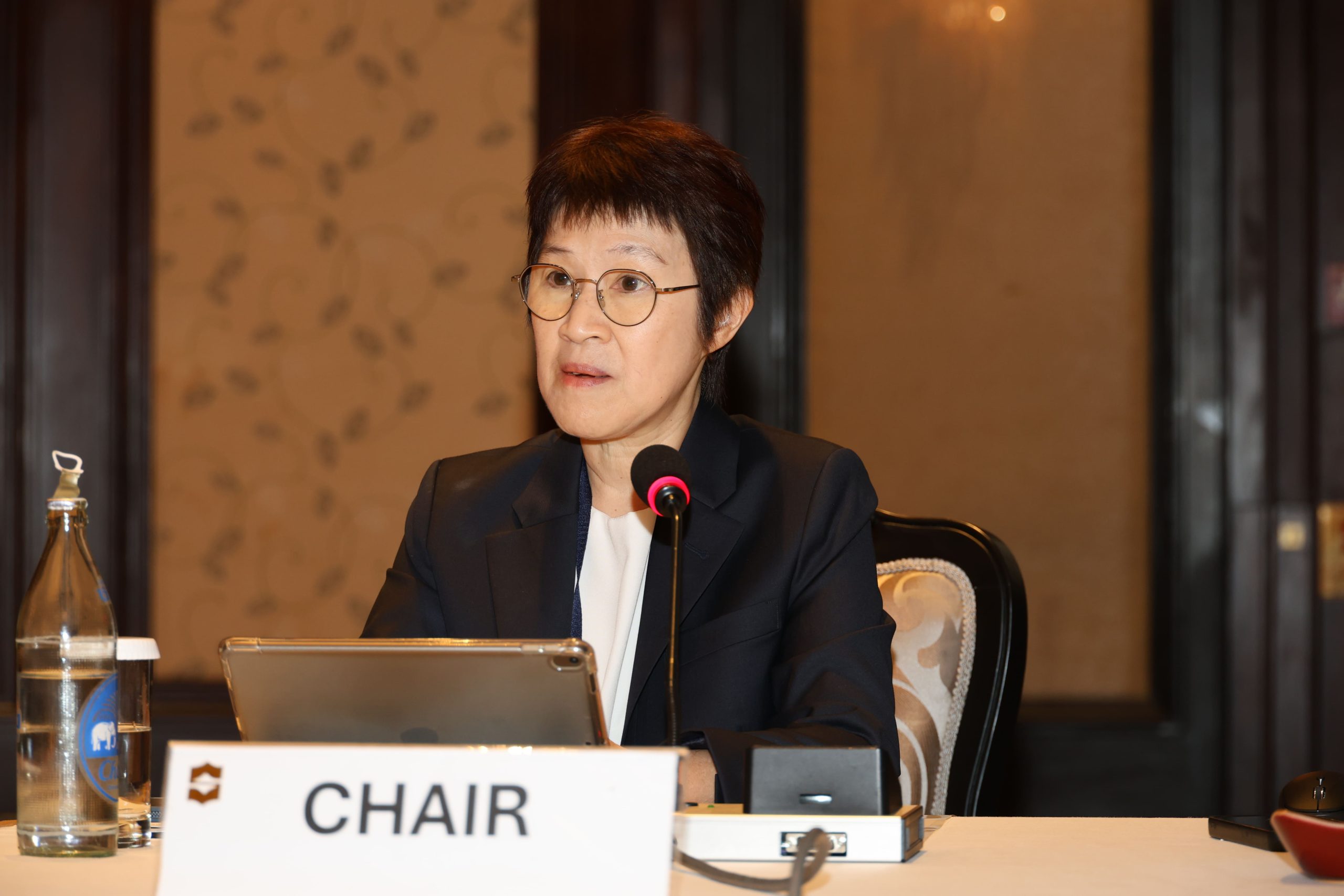Economic Cooperation Program
in the 6-Country Greater Mekong Subregion
Greater Mekong Subregion Economic Cooperation Program: GMS
Important News and Updates
27th GMS Ministerial Meeting: Uniting Government-Private Sector-Local Communities to Drive Towards an Inclusive Growing Subregion
On Friday, November 28, 2025, Thailand hosted the 27th Greater Mekong Subregion Economic Cooperation Program Ministerial Conference (The 27th GMS Ministerial Conference) at the Shangri-La Hotel, Thailand. Mr. Sihasak Phuangketkeow, Minister of Foreign Affairs, serving as Thailand’s GMS Minister, chaired the meeting. The conference was attended by H.E. Chhieng Yanara, Minister Attached to the Prime […]
Business Council and Local Government Forum during the 27th GMS Ministerial Meeting
On November 27, 2025, during the 27th GMS Ministerial Meeting, parallel discussion forums were organized, including the 2025 GMS Business Forum and the Local Governments’ Forum, which reflected the core concept of this year’s ministerial meeting that emphasized promoting inclusive growth, balanced development, and prosperity through the integration of local governments and the private sector […]
Senior Officials’ Meeting during the 27th Ministerial Conference of the Six-Country Greater Mekong Subregion Economic Cooperation Program
On November 26, 2025, the Office of the National Economic and Social Development Council (NESDC), in collaboration with the Asian Development Bank (ADB), organized the Senior Officials’ Meeting during the 27th Ministerial Conference of the Six-Country Greater Mekong Subregion Economic Cooperation Program (Greater Mekong Subregion: GMS) at the Shangri-La Hotel, Bangkok. Mr. Danucha Pichayanan, Secretary-General […]
3rd Senior Officials Meeting 2025 of the Greater Mekong Subregion Economic Cooperation Program
On September 29, 2025, the Office of the National Economic and Social Development Council, in collaboration with the Asian Development Bank (ADB), organized the 3rd Senior Officials Meeting/2025 of the Greater Mekong Subregion Economic Cooperation Program (Greater Mekong Subregion: GMS) at Shangri-La Hotel, Bangkok. The meeting was chaired by Ms. Sasithorn Platthadech, Deputy Secretary-General of […]
3rd Senior Officials Meeting 2025 of the Greater Mekong Subregion Economic Cooperation Program
On September 29, 2025, the National Economic and Social Development Council, in collaboration with the Asian Development Bank (ADB), organized the 3rd Senior Officials’ Meeting of 2025 for the Greater Mekong Subregion Economic Cooperation Program (GMS) at Shangri-La Hotel, Bangkok. The meeting was chaired by Ms. Sasithorn Platthadech, Deputy Secretary-General of the National Economic and […]
1st Senior Officials Meeting 2025 Greater Mekong Subregion Economic Cooperation Program
On March 17, 2025, the Office of the National Economic and Social Development Council, in collaboration with the Asian Development Bank (ADB), organized the 1st Senior Officials Meeting 2025 Greater Mekong Subregion Economic Cooperation Program (GMS) at Amari Hotel Bangkok, with Mr. Danucha Pichayanan, Secretary-General of the National Economic and Social Development Council, serving as […]
The Prime Minister Attends the 8th Leaders’ Meeting of the Greater Mekong Subregion Economic Cooperation Program (GMS)
On November 7, 2024, Ms. Paetongtarn Shinawatra, Prime Minister, attended the 8th Leaders’ Meeting of the Greater Mekong Subregion Economic Cooperation Program (GMS) in the Greater Mekong Subregion 6 countries in Kunming, Yunnan Province, People’s Republic of China. Mr. Li Qiang, Premier of the People’s Republic of China, chaired the meeting, along with leaders from […]
Special Senior Officials’ Meeting for IMT-GT and GMS Programs and other Related Meetings
From August 20-22, 2024, Ms. Sasithon Palattadej, Policy and Planning Advisor, along with NESDC officials, attended the Special Senior Officials’ Meeting for the Indonesia-Malaysia-Thailand Growth Triangle (IMT-GT) Development Program,
the Greater Mekong Subregion Economic Cooperation Program (GMS),
and other related meetings in Jakarta, Republic of Indonesia. Representatives from the ASEAN Secretariat, Asian Development Bank, and relevant agencies also participated in the meetings.
GMS Senior Officials’ Meeting in Yuxi City, Yunnan Province, People’s Republic of China
On May 17, 2024, Mr. Wanchat Suwankitti, Deputy Secretary-General of the National Economic and Social Development Council, attended the Senior Officials’ Meeting of the Greater Mekong Subregion Economic Cooperation Program (GMS) as the representative of Thailand in Yuxi City, Yunnan Province, People’s Republic of China. The meeting aimed to discuss preparations for the 8th GMS […]


General Information about the GMS Program
The Greater Mekong Subregion Economic Cooperation Program (GMS Program) is a cooperation framework among 6 countries in the Mekong River Basin, including Cambodia, Lao PDR, China (Yunnan Province and Guangxi Zhuang Autonomous Region), Myanmar, Thailand, and Vietnam. It was initiated in 1992 through the efforts of these 6 countries and with support from the Asian Development Bank (ADB) to promote economic, social, and environmental cooperation based on the comparative advantages of each country. Currently, the GMS Program operates under the GMS Economic Cooperation Program Strategic Framework 2030, which aims to develop the Greater Mekong Subregion into an integrated, prosperous, sustainable, and inclusive subregion.
The implementation of the GMS Program throughout its history has been based on 3 pillars of development, or the 3Cs principle, consisting of:

Connectivity
Focusing on sustainable physical infrastructure development and upgrading transportation networks to become economic corridors

Competitiveness
Facilitating cross-border movement of people and goods, developing production chains, agriculture, tourism, and urban development

Community
Building a community with a shared future by promoting cross-border cooperation in public health and the environment, as well as improving the well-being of the people.
The GMS Program emphasizes the concept of developing Economic Corridors, which involves connecting cross-border economic areas through infrastructure, policy coordination, and harmonization of regulations. This aims to promote economic activities and the movement of goods, services, people, and capital in the Greater Mekong Subregion. There are 3 main economic corridors:
(1) North-South Economic Corridor (NSEC) is the main route connecting southern China and Lao PDR to access the sea.
(2) East-West Economic Corridor (EWEC) is a route connecting major economic cities between Vietnam, Lao PDR, Thailand, and Myanmar, covering a total distance of 1,500 kilometers.
(3) Southern Economic Corridor (SEC) is a route connecting major economic cities between Thailand-Cambodia-Vietnam, including Myanmar, and Vietnam-Cambodia and Laos.

GMS Program Economic Corridors
There are 3 main economic corridors:
(1) North-South Economic Corridor (NSEC) is the main route connecting southern China and Lao PDR to access the sea.
(2) East-West Economic Corridor (EWEC) is a route connecting major economic cities between Vietnam, Lao PDR, Thailand, and Myanmar, covering a total distance of 1,500 kilometers.
(3) Southern Economic Corridor (SEC) is a route connecting major economic cities between Thailand-Cambodia-Vietnam, including Myanmar, and Vietnam-Cambodia and Laos.

A framework for investment in near-term projects aligned with GMS development objectives. Currently operating under RIF 2025, covering the period 2023-2025, comprising 111 projects across all 6 countries.
Sectoral Working Groups
Cross-Sectoral Operations
Driven through the following key meeting mechanisms:
Summit Level
The highest-level meeting mechanism led by organizational leaders. The GMS Summit is held every 3 years to set the overall strategy of the program and monitor implementation progress.
Ministerial Level (Ministerial Conference)
A meeting mechanism for GMS ministers from each country, held annually to review past performance and set policy directions for various projects according to the strategies defined at the Summit.
Senior Officials’ Meetings
The highest-level meeting mechanism for GMS officials, held 3-4 times a year to follow up on the implementation of directives from policy-level meetings.
Sectoral Working Groups
(Working Groups)
Meetings in 10 main cooperation sectors, along with specific working groups or discussion forums for each issue.
GMS Secretariat
Responsible for providing technical support, overall management, and coordination to drive the GMS Program, with ADB serving in this role.
GMS National Secretariats
The main coordinators for each GMS member country, providing support for GMS Program activities and monitoring implementation.



Enhancing GMS Program Mechanisms
Studies to develop mechanisms for driving the GMS Program, such as the GMS Innovation Strategy for Development 2030, which will be presented at the 8th GMS Summit in 2024. Enhancing the participation of the private sector, local governments, and knowledge networks in the GMS Program.

Addressing Common Challenges in the Subregion
Cooperation with neighboring countries to jointly manage subregional issues, especially in digital economy transition and climate change adaptation, through the implementation of GMS Program projects.

Being an Open Cooperation Framework
Promoting alignment and synergy between the GMS Program, the Belt and Road Initiative, the Mekong-Lancang Cooperation Framework, the Global Development Initiative, ASEAN, and other regional and global cooperation projects.































